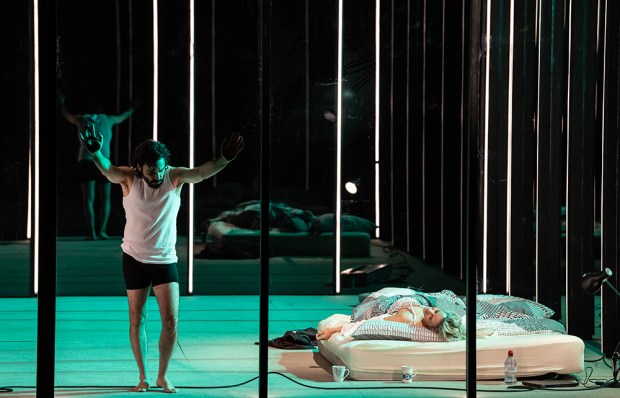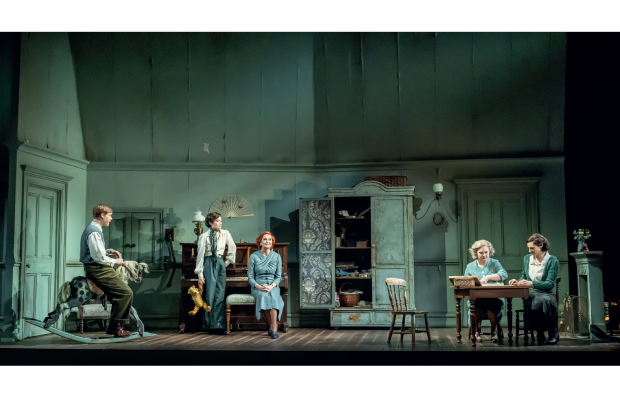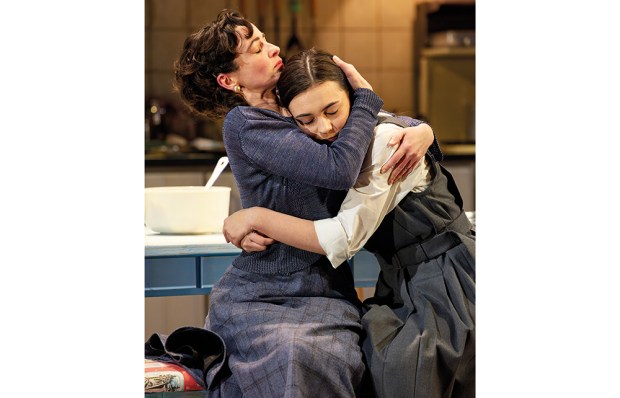Alan Bennett’s new play, Allelujah!, is an NHS drama set in a friendly hospital in rural Yorkshire. Colin, an ambitious local boy turned metropolitan yuppie, has arrived from London to visit his sick father and he takes the opportunity to assess the efficiency of the hospital on behalf of his bosses at the health department in Whitehall. Meanwhile, a TV crew has found evidence that a staff member is murdering elderly patients to create vacant beds for new arrivals. Bennett’s sentimental adoration of the NHS leads him to misrepresent a couple of political issues. It’s false to suggest that any well-run hospital is bound to be flogged to the commercial sector. And although he laments ‘privatisation’, he neglects to mention that it was introduced by Labour.
However, the play brilliantly captures the Kardashian narcissism that afflicts most NHS employees. Whenever a TV crew shows up, the staff abandon their patients and turn towards the lens to explain why they find it so hard to care for the sick. The story focuses on a ward of elderly bed-blockers who enjoy singalongs and who like to exercise by performing ballroom dance routines helped by volunteer nurses. (Such unlikely details remind us that this is primarily an escapist fantasy.) The dialogue is amusing, sometimes hilarious. A woman describes her old mum’s religious persuasions. ‘She was C of E but with all these vicars being had up she went over to atheism.’
The short scene at the start of Act Two may be among the best Bennett has ever written. A granny dies suddenly, and her daughter and her son-in-law arrive to collect the sad contents of her locker: a half-consumed bottle of Lucozade and a slice of rhubarb crumble wrapped in tissue paper ‘for later’. Bennett turns these tawdry relics into a dazzling passage of macabre comedy.
And he offers us a terrific range of quirky characters. Simon Williams, looking like Oscar Wilde left out in the snow, plays a distinguished grammarian who gives English lessons to foreign doctors. Deborah Findlay plays the steely Sister Gilchrist whose love of the NHS has driven her half-mad. Peter Forbes works wonders as the oily hospital boss, Salter, a smug oaf whose pomposity is tempered by a certain daintiness and vulnerability. To help save his hospital, Salter coins a progressive soundbite which he hopes will summarise its values. ‘Yesterday is the new tomorrow.’ I should add that my ardour for Bennett is cooler than the national average and I particularly disliked The History Boys which, rather weirdly, seemed to champion schoolroom paedophiles. But this is one of Bennett’s finest efforts. At 150 minutes, it’s over-long for a comedy and the co-ordinated disco dances are an indulgence too far. Nevertheless, the Bridge has finally found the hit it needs. With a cast of 25, it’s unlikely to tour. See it here.
A Monster Calls, from the best-selling novel by Patrick Ness, introduces us to 13-year-old Conor. Poor kid. He’s having a terrible time. His sick mum can’t cope. His runaway dad lives in America with a new family. His kindly grandmother invites him to stay but fussy Conor can’t bear her tidy house and its collection of precious antiques. School is worse. The staff are talentless dim-wits who have nothing to teach and many years in which to teach it. The playground teems with bullies and when they attack Conor he’s saved by a brave female pupil, but he rejects her help and sides with the thugs. This leaves him without a friend in the world. Well, no wonder.
There’s nothing to like about this whiny, talentless, ungrateful nonentity. We’re supposed to feel sorry for him because his mum keeps vomiting into a wok but there are worse fates than nursing a diseased parent. And he might show a bit of gratitude towards his gran (Selena Cadell, superb), but his rampant ego has destroyed any trace of decency or humility. He’s rescued by a dryad, or woodland spirit, which emerges from a yew-tree in his back garden. Visually, the spirit is ingeniously done with a cluster of gymnasium ropes to represent the trunk and the boughs. But the spirit himself, played by Stuart Goodwin, is a shouting, preening lager-lout. Like all the actors, he performs with a mike which destroys the intimacy and warmth of the theatrical experience. The moral of the tale appears to be that savagery is best answered with greater savagery. With the tree-spirit’s help, the bully is beaten half to death. When the list of his injuries is read out it sounds like an autopsy. I loathed every minute of this heartless, noisy ordeal but the show is not aimed at me. My 12-year-old son rated it ‘among the top five shows I’ve ever seen’. The roars at the curtain-call suggested that the audience agreed.
Got something to add? Join the discussion and comment below.
Get 10 issues for just $10
Subscribe to The Spectator Australia today for the next 10 magazine issues, plus full online access, for just $10.
You might disagree with half of it, but you’ll enjoy reading all of it. Try your first month for free, then just $2 a week for the remainder of your first year.














Comments
Don't miss out
Join the conversation with other Spectator Australia readers. Subscribe to leave a comment.
SUBSCRIBEAlready a subscriber? Log in